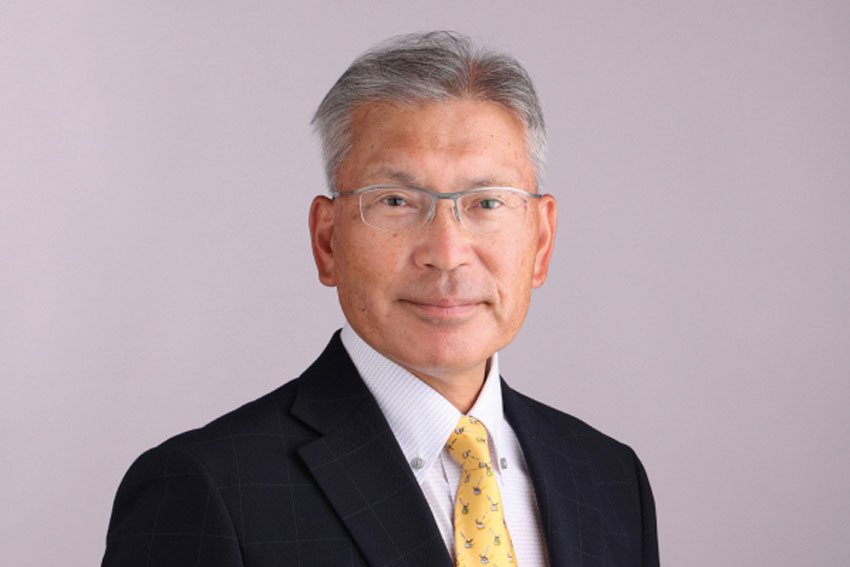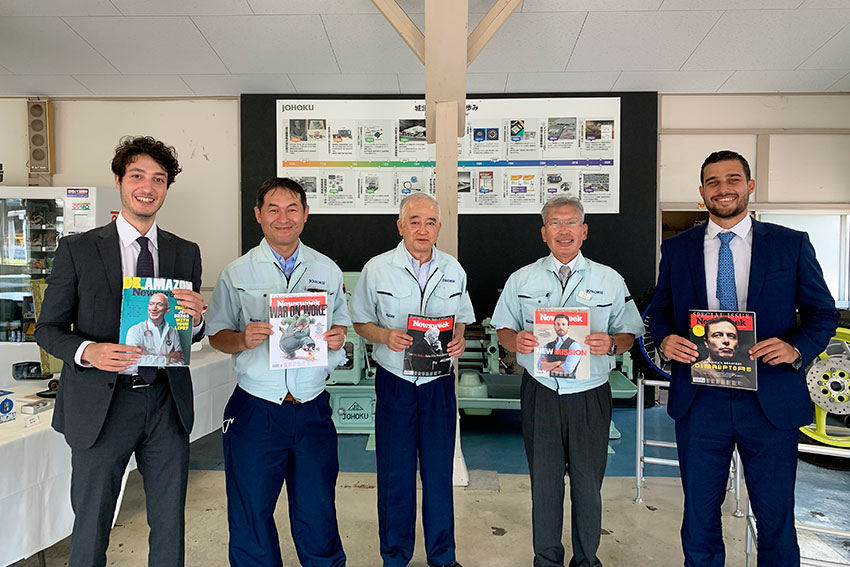Since its foundation in 1918, Johoku Industrial has been one the most trusted manufacturing partners for Japan’s motorcycle and wider automotive industry. Of the company’s production volume, 70% is for motorcycles – its main products being cast wheels and spoke wheels among others – with the remaining 30% for automobiles, where an increasing proportion of this is focused on technologies considered the future of mobility, including parts for the fuel cell vehicle (FCV) and electric vehicle (EV) markets.

Can you tell us a little more about your monozukuri, and the strengths of Johoku that allow you to compete in international markets?
All Japanese car and motorcycle manufacturers have their manufacturing works globally and because of this, there is little room for domestic local suppliers of our size to be a player in their global game. That is a situation that we cannot change by ourselves.
Every company is the same way. The simplest and cheapest models are to move to a foreign country first. They can’t move everything because key parts of the engine or controller, or key components, are difficult to produce in foreign places. The second reason for this is because there is not enough demand for these parts themselves.
If there was a huge volume involved, they could move production to a foreign country but may involve high price models but small production volume, which is not enough to make it cost competitive to produce in East Asia and other regions.
My background was at a major motorcycle company. After working at that company, I moved to work here six years ago. My job there was to transfer production to foreign countries as a production engineer and manufacturing engineer, and to manage motorcycle product design (exterior plastic parts), production strategy (Japan, worldwide), die strategy, and human resource strategy.
The difficulty in Japan for motorcycle companies was that it was difficult to get a good price from a vendor in small volume production. An especially difficult point is the seasonal production of motorcycles, which is less in summer and about twice as much in winter. Some companies moved to foreign countries, including automobiles and motorcycles makers, but the suppliers (especially T2, T3, etc.) found it impossible to move together with them. That’s the situation at the moment.
Of our production volume, 70% is for Motorcycles, 30% is for Automobiles engine parts including outboard motor parts, FCV car parts and EV car parts. Motorcycle production volume is three times smaller than 20 years ago in Japan. But we keep the manufacturing cost the same or lower through Monozukuri Kaizen.
We follow the already developed theoretical value production. That analysis is very important. Industrial Engineering (IE) may have started in the United States or Europe.
That is very important. The theoretical value production itself is basically IE technology or theory. That reduction of our costs is basically achieved via the theoretical value production idea. We are still in the process of implementing Kaizen with our theoretical value production.
How did you get involved in the FCV Car project? Can you tell us more about the part you supply and why you believe Johoku was chosen to be part of such an exciting project?
Our product is a critical part that supports the high-pressure hydrogen tanks for the FCV car on both ends. It uses aluminum, not stainless steel, but it withstands high pressure. In this arrangement, Johoku is a Tier 2 company with a forging company being a Tier 1 supplier. We do the machining.
The difficulty with the CNC Compound Lathe is that even small scratches are no good. If there’s too much pressure inside, this could create micro-cracks and scratches which could be very dangerous.
Why have you chosen to specialize in aluminum die casting?
Aluminum parts production is basically done in two ways. One is casting (die-casting, low pressure die casting, gravity casting); the other is forging which makes the material very hard and strong. The forging of parts is good for preventing leaks. We can arrange both ways (aluminum casting & forging), and then we can do machining and painting and assembly in-house.
Would you say you see the move to EVs as more of an opportunity or a threat to your business?
We could get involved in the production of heat exchangers for EVs, which are key parts for temperature reduction. Temperature controlling is very important when it comes to the lifecycle of both motors and batteries. We already have manufactured the two parts for EV cars, our direction is therefore towards EVs because of these necessity for heat exchangers.
Many Japanese companies that are Tier 2 suppliers are concerned about long standing contracts with Tier 1 companies not being renewed and that too much reliance on one client represents an existential risk to them. Are you looking for other companies to partner with in the international market, and supply some of your parts there?
We have a factory in Chennai, south of India, and the main customer is a Japanese motorcycle company. The second customer is a local motorcycle company. We have started to contact Indian EV motorcycle companies also. That is our start into EVs in India.
Another thing is that India is a big country and there is a large group company, with whom we established a technical assistance agreement for two wheels three years ago. They have engaged in joint ventures with many Japanese companies. They trust each other’s businesses and their communication channels.
They know who we are and what technology we have. Japan has a lot of good technology, and so they began doing business with Japan, and entering into joint ventures with Japanese companies.
India has a huge population who buy 25 million motorcycles a year. It was the same in China, but now it is India’s turn.
You have mentioned your desire to find more business partners in India and more joint ventures. Can you elaborate a little more about how you plan to tackle that market?
Our core technology is machining that processes steel and aluminum. The second technology is the painting technology of aluminum parts. And finally there’s the assembly. Our strategy covers these three areas in Japan and India.
Mainly, we have very good records in motorcycles – the wheels, the frame and others. And of course, aluminum parts of the engines for motorcycles and automobiles. Other areas are marine outboard motors and agricultural machinery. Currently our agricultural machinery customers are in Japan only. We have not yet developed an agricultural machinery business area in India but it’s now under our study.
With regard to your initiative to enter the aerospace business, will you be looking for joint ventures or technical tie-ups? How are you going to enter the aerospace industry?
As you know, aerospace is a new frontier for us. There is a joint association called SOLAE. 14 companies in Shizuoka Prefecture are members of the association. Last month we took part in an aerospace exhibition in Tokyo. These 14 companies are working together and several companies are already recognized as Tier 1, but we are still working for it. We will be working together to share market information.
Do you see the aerospace field as a mostly domestic business for you, or do you see it more as a global business?
Domestic first, but the business is very slow now. We have joined the aerospace company trial event, and so we are having to work closely with association members and challenge ourselves again. That is our strategy right now.
Are you planning to approach any major American aerospace manufacturers?
No. The two most important requirements from an aerospace company are firstly, that one have a JISQ 9100 industry standard certification, as per industry requirements. On this point, we qualified three years ago. The other requirement is that we have sales and production records of regular parts.
As you mentioned, you are already present in India and you're looking to strengthen your position there. Are you looking to expand into any other countries?
First of all, I must explain that I was working at one of the major motorcycle companies for their overseas production strategy and manufacturing around the world. Based on the experience with the company, I now work with Johoku who has about 170 employees here in Japan and 250 in India, so we will concentrate on the business in India first. We will try the ASEAN market in the future if possible.
How would you be looking to tackle this market?
We need to try and develop new business with unit makers either in Japan or the ASEAN. Sometimes we ask to come out to Indonesia or Malaysia, which is difficult for the moment, but there are still a number of companies who are looking for Japanese companies to work with.
Not so many Japanese companies have their factories in India. So there are business people who are interested in our factory. Some of them are global companies of course so having an account with them opens doors to exporting to companies all over the world.
Let's say we come back to interview you again in a few years' time for your company’s 110th anniversary. What would you like to tell us about your goals and dreams for the company in that timeframe, and what would you like to have achieved by then?
One of my many dreams is to have new manufacturing technology in aerospace so that we would be able to machine jet engine parts by ourselves. We already tried with INCONEL. We’re working together with Shizuoka University to achieve our target. There are professors working with us on a micro level.
We are doing a basic study with university professors. For example at the macro level, the cutting process seems like the blade is actually cutting the material. However, if you look at it on the micro level, it’s just scraping the material, with energy of vibrations and heat and sound and other forms. By looking at it on the micro level more you can determine what is actually happening, so that we can improve and change the quality and the processes themselves.

0 COMMENTS